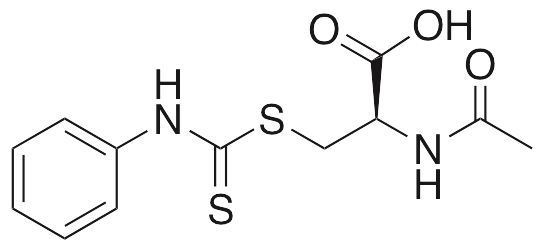Description
N-Acetyl-S-(N’-phenylthiocarbamoyl)-L-cysteine (PITC) is a cysteine conjugate of N-acetyl-phenylisothiocyanate. Isothiocyanates are typically found in plants of the Brassicaceae family, including broccoli, cabbage, and radish. Isothiocyanates are best known for their antioxidative, anticancer chemotherapeutic, chemopreventive, anti-angiogenic, and antibiotic properties. PITC also exhibits vasodilatory properties that are linked to its release of H2S, causing membrane depolarization of vascular smooth muscle cells. PITC inhibits lipid peroxidation, scavenges hydroxyl radicals, and decreases nitrite production in vivo, inhibiting tumor development and increasing life span in animal models of cancer. Additionally, PITC decreases expression of VEGF, IL-1β, IL-6, GM-CSF, and TNF-α and increases expression of IL-2 and tissue inhibitor of metalloproteinase 1 (TIMP1), inhibiting cell proliferation in vitro; these anti-angiogenic effects also occur in vivo, as PITC decreases capillary formation and vessel outgrowth in animal models. PITC exhibits antibacterial activity against species of Bacillus, Staphylococcus, Enterococcus, Salmonella, and Enterobacter, altering surface charge and hydrophilicity, resulting in membrane depolarization and cell death; it also displays anti-parasitic activity against nematodes of the genus Heterodera. This compound shows immunomodulatory activity as well, increasing total white blood cell count, antibody titer, and number of plaque-forming cells in animal models.
